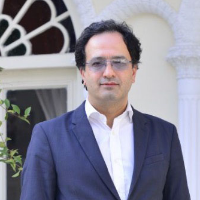Artificial Intelligence(AI) And Evolution In The Political-Social Realm(Case Study: The American Elections 2024)
Today, one of the main concerns of experts and people, due to the speed of technological progress and its availability, is the consequences of the expansion of artificial intelligence in the social-political fields. The experience of the last decade, which coincided with the emergence of social networks and virtual platforms, shows that as much as the developments in the field of technology and media, political-social developments and transformations are also accelerated and affected by them. So that between the holding of one election and the next, the political and social environment has completely changed, and the need to recognize the factors and variables affecting it is felt. In the upcoming research, with a descriptive-analytical approach and using library sources, documents and valid surveys, the effects of artificial intelligence in the political-social arena have been analyzed. It has also been tried to provide a conceptual tool for studying artificial intelligence in a complex multi-level environment. Evaluating and determining the strengths and weaknesses of this process is different by considering the specific political and social attitudes of each society; But what is certain is that the application and speed of spreading these tools has made the world of politics and social life more complicated than in the past, coupled with uncertainty and facing a vague outlook.
-
The Role of the Arbaeen Procession in Public Diplomacy of Iran
Habib Golmohammadi, Ebrahim Mottaghi *, Kaeyhan Barzegar
Journal of transcendent Policy, -
Continuity and Change in the Relations between Iran and Russia; A look from a Logging Perspective
Seyyed Ruhollah Haj Zargarbashi, *, Mohammad Bagher Mokaremipour
Journal of Diplomatic Interactions, -
Consequences of the identity attitude towards the West in the foreign policy of the Islamic Republic of Iran and the Republic of Turkey (the period of Justice and Development Party)
Mahdi Vahidi, Keihan Barzegar *, Davood Kiani
Quarterly of Geography (Regional Planing),




